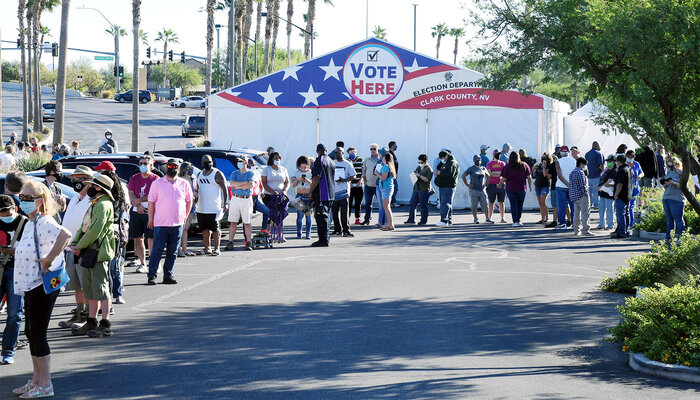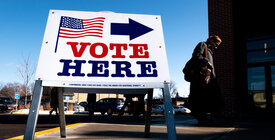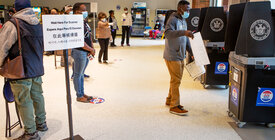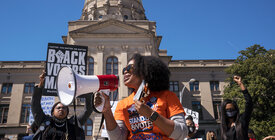
Voting Laws Roundup: October 2021
In an unprecedented year so far for voting legislation, 19 states have enacted 33 laws that will make it harder for Americans to vote.

Part of
Click here for the most recent Voting Laws Roundup.
Editor’s note: A recap of 2021’s voting laws as well as a look at voting legislation planned for 2022 can be found here.
The 2020 federal election drew the United States’ highest voter turnout in more than a century, breaking records despite the Covid-19 pandemic and efforts to undermine the election process with the Big Lie of a stolen election.
In a backlash to this historic voter participation, many state lawmakers have proposed and enacted legislation to make it harder for Americans to vote, justifying these measures with falsehoods steeped in racism about election irregularities and breaches of election security.
In all but seven states, regular legislative sessions are now over.1 Between January 1 and September 27, at least 19 states enacted 33 laws that make it harder for Americans to vote.
At the same time, lawmakers in many states responded to Americans’ eagerness to vote by making it easier for eligible voters to cast their ballots. Between January 1 and September 27, at least 25 states enacted 62 laws with provisions that expand voting access.
But this expansive legislation does not balance the scales. The states that have enacted restrictive laws tend to be ones in which voting is already relatively difficult, while the states that have enacted expansive laws tend to have relatively more accessible voting processes. In other words, access to the right to vote increasingly depends on the state in which a voter happens to reside.
Congress has the power to protect American voters from the kinds of restrictions enacted so far this year. The Freedom to Vote Act, which is currently before the Senate, is a comprehensive package of voting, redistricting, and campaign finance reforms. It includes national standards for voting that would ensure access to the ballot across state lines. The John Lewis Voting Rights Advancement Act, which has passed in the House, would complement the Freedom to Vote Act. In many instances, it would prevent changes to voting rules that discriminate on the basis of race or membership in language minority groups from being implemented, and it would restore voters’ robust ability to challenge discriminatory laws. Three of the four omnibus restrictive laws were enacted in states that would be subject to preclearance under the John Lewis Act (FL, GA, TX).
Restrictive Legislation
The 33 laws enacted so far in 2021 have various impacts, including but not limited to making mail voting and early voting more difficult, imposing harsher voter ID requirements, and making faulty voter purges more likely.2
In an emerging trend, restrictive laws in four states — Georgia, Iowa, Kansas, and Texas — impose new or more stringent criminal penalties on election officials or other individuals.3 These new criminal laws will deter election officials and other people who assist voters from engaging in ordinary, lawful, and often essential tasks. People in Georgia can now be charged with a crime for handing out water or snacks to voters waiting in line at the polls.4 In Iowa and Kansas, people could face criminal charges for returning ballots on behalf of voters who may need assistance, such as voters with disabilities.5 And in Texas, election officials could face criminal prosecution if they encourage voters to request mail ballots or regulate poll watchers’ conduct.6
The state laws restricting voting access are not created equal. Four of the 33 laws are mixed, meaning they contain pro-voter policies as well as policies that make voting more difficult (IN S.B. 398, KY H.B. 574, LA H.B. 167, OK H.B. 2663). Other laws are relatively narrow in their scope (e.g., NV S.B. 84, UT H.B. 12). By contrast, Florida, Georgia, Iowa, and Texas have enacted omnibus laws that each contain several new restrictive provisions.7
Four states have passed multiple restrictive voting laws. Arkansas and Montana passed four such laws each, while Arizona and Texas passed three each).
Most recently, Texas enacted S.B. 1, omnibus legislation that disproportionately burdens Latino, Black, and Asian voters and makes it harder for those who face language access barriers or who have disabilities to get help casting their ballots. The law also constrains election workers’ ability to stop harassment by poll watchers and bans 24-hour and drive-thru voting, among other measures. In a state where it was already hard to vote, S.B. 1 compounds the barriers faced by Texas voters. The Brennan Center is challenging S.B. 1 in federal court.8
More than 425 bills with provisions that restrict voting access have been introduced in 49 states in the 2021 legislative sessions.
Expansive Legislation
Between January 1 and September 27, 2021, at least 25 states enacted 62 laws with provisions that expand voting access.9 These expansive policies ease the processes for requesting and casting a mail ballot, expand early voting time periods, lengthen the deadline by which an elections office must receive and count mail ballots after Election Day, improve access for disabled voters, and strengthen language access provisions, among other measures. Nearly 1,000 bills with expansive provisions have been introduced in 49 states in the 2021 legislative sessions.
Access to the right to vote increasingly depends on the state in which a voter happens to reside. More than two-thirds of the states (17 of 25) that enacted expansive laws did not enact restrictive legislation as well. The 25 states that have enacted legislation with expansive provisions include the four states with mixed legislation (IN, KY, LA, and OK) and four states that enacted both restrictive and expansive laws (MT, NH, NY, and NV).
Eight states extended or made permanent policies first implemented temporarily in 2020 in response to Covid-19, such as sending mail ballots to all voters, implementing curbside voting, and allowing no-excuse early voting.10
Three states (CT, NY, and WA) expanded voting rights to people with past convictions, building on national momentum to undo felony disenfranchisement laws.11
And six states enacted automatic voter registration (AVR) laws. Connecticut and Delaware adopted AVR legislatively, while Illinois, Maine, Nevada, and New York expanded existing AVR programs.12
Endnotes
-
1
MA, MI, NC, NJ, OH, PA, and WI are still in regular session. Many states, however, are holding special legislative sessions for redistricting. -
2
AL H.B. 285, AL H.B. 538, AR H.B. 1112, AR H.B. 1244, AR H.B. 1715, AR S.B. 643, AZ S.B. 1003, AZ S.B. 1485, AZ S.B. 1819, FL S.B. 90, GA S.B. 202, IA S.F. 413, IA S.F. 568, ID H.B. 290, IN S.B. 398, KS H.B. 2183, KS H.B. 2332, KY H.B. 574, LA H.B. 167, MT H.B. 176, MT H.B. 530, MT S.B. 169, MT S.B. 196, NH H.B. 523, NH S.B. 31, NV S.B. 84, NY S.B. 264, OK H.B. 2663, TX H.B. 3920, TX S.B. 1111, TX S.B. 1, UT H.B. 12, WY H.B. 75. Provisions are categorized as restrictive if they would make it harder for Americans to register, stay on the rolls, and/or vote, as compared to existing state law. -
3
GA S.B. 202, IA S.F. 413, KS H.B. 2183, TX S.B. 1. In addition, other newly enacted laws impose new criminal penalties, including AZ H.B. 2794 and TX H.B. 574. -
4
GA S.B. 202. -
5
IA S.F. 413, IA S.F. 568, KS H.B. 2183. -
6
TX S.B. 1. -
7
GA S.B. 202, FL S.B. 90, IA S.F. 413, TX S.B. 1. -
8
In addition to Texas S.B. 1, the two other restrictive bills enacted since the Brennan Center’s last roundup are NH S.B. 31 and NY S.B. 264, both less sweeping in scope than Texas’s omnibus legislation. New Hampshire S.B. 31 allows immediate purges based on unreliable information. New York S.B. 264 shortens the time period for voters to mail absentee ballots applications (shifting from a “mailed-by” deadline of seven days before Election Day to a “received-by” deadline of 15 days before Election Day). -
9
CA A.B. 37, CA S.B. 29, CA S.B. 152, CA S.B. 503, CO H.B. 1011, CT S.B. 1202, DE S.B. 5, HI S.B. 159, HI S.B. 548, IL H.B. 1871, IL H.B. 3235, IL S.B. 825, IN S.B. 398, IN H.B. 1479, IN H.B. 1485, KY H.B. 574, LA H.B. 167, LA H.B. 286, MA H. 73, MA H. 3973, MD H.B. 206, MD S.B. 596, MD H.B. 745, MD H.B. 1048, MD S.B. 525, MD S.B. 683, ME L.D. 1399, ME L.D. 221, ME L.D. 1126, ME L.D. 1363, ME L.D. 1575, MN H.F. 1952, MT S.B. 15, ND H.B. 1078, ND H.B. 1253, ND H.B. 1447, NH H.B. 555, NJ S.B. 3203, NM H.B. 231, NV A.B. 121, NV A.B. 321, NV A.B. 432, NY A.B. 2574, NY A.B. 6046, NY A.B. 6047, NY S.B. 830B, NY S.B. 5545, OK H.B. 2663, OR H.B. 2681, OR H.B. 3021, OR H.B. 3291, VA H.B. 1888, VA H.B. 1921, VA H.B. 1968, VA H.B. 2125, VA S.B. 1097, VA S.B. 1245, VA S.B. 1331, VA S.B. 1395, VA H.B. 1890, VT S.B. 15, WA H.B. 1078. Provisions are categorized as expansive if they would make it easier for Americans to register, stay on the rolls, and/or vote, as compared to existing state law. -
10
CA S.B. 29 and CA A.B. 37 (sending mail ballots to all voters), CT S.B. 1202 (Covid-19 as absentee excuse; drop boxes), IL H.B. 1871 (curbside voting; drop boxes), KY H.B. 574 (no-excuse early voting; drop boxes; online mail ballot application; opportunity to cure mail ballot signature), MA H. 73 and MA H. 3973 (no-excuse mail voting; expanded no-excuse early voting), ME L.D. 1399 (remote notarization for absentee ballots), NV A.B. 321 (sending mail ballots to all voters), VT S.B. 15 (mail ballot postage; sending mail ballots to all voters; drive-thru voting; drop boxes). -
11
CT S.B. 1202, NY S.B. 830B, WA H.B. 1078. -
12
CT S.B. 1202, DE S.B. 5, IL H.B. 3235, ME L.D. 1363, NV A.B. 432, NY A.B. 2574.
Previous Roundups
-
Voting Laws Roundup: July 2021
Eighteen states have already enacted 30 laws this year that will make it harder for Americans to vote. -
Voting Laws Roundup: May 2021
States have already enacted more than 20 laws this year that will make it harder for Americans to vote — and many legislatures are still in session. -
Voting Laws Roundup: March 2021
State lawmakers continue to introduce new restrictive voting provisions, and voter suppressive bills have begun to advance and become law.
More from the State Voting Laws Roundups series
-
Voting Laws Roundup: July 2021
Eighteen states have already enacted 30 laws this year that will make it harder for Americans to vote. -
Voting Laws Roundup: May 2021
States have already enacted more than 20 laws this year that will make it harder for Americans to vote — and many legislatures are still in session. -
Voting Laws Roundup: March 2021
State lawmakers continue to introduce new restrictive voting provisions, and voter suppressive bills have begun to advance and become law.



